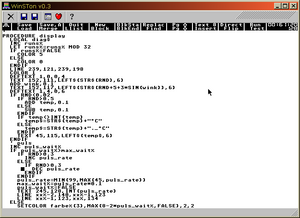GFA BASIC

A screenshot of the GFA BASIC editor.
|
|
| Original author(s) | Frank Ostrowski |
|---|---|
| Initial release | 1986 |
| Stable release |
3.6
|
| Development status | Discontinued |
| Operating system | Amiga, Atari ST, MS-DOS, Microsoft Windows |
| Type | BASIC |
GFA BASIC is a dialect of the BASIC programming language, by Frank Ostrowski. The name is derived from the company ("GFA Systemtechnik GmbH"), which distributed the software. In the mid-1980s to the 1990s it enjoyed popularity as an advanced BASIC dialect, but has been mostly superseded by several other programming languages. Official support ended in the early 2000s.
GFA BASIC was developed by Frank Ostrowski at "GFA Systemtechnik GmbH" (later "GFA Software"), a German company in Kiel and Düsseldorf. GFA is an acronym for "Gesellschaft für Automatisierung" ("Company for Automation"), which gave name to the software. The first GFA BASIC version was released in 1986. In the mid and late 1980s it became very popular for the Atari ST home computer range, since the Atari ST BASIC shipped with them was more primitive. Later, ports for the Commodore Amiga, DOS and Windows were marketed. Version 2.0 was the most popular release of GFA BASIC as it offered then many more advanced features compared to alternatives. GFA BASIC 3.0 included further improvements like support for user-defined structures and other agglomerated data types. The final released version was 3.6. Around 2002 GFA software ceased all GFA BASIC activities and shut down the mailinglist and website in 2005. Due to missing official support and availability of GFA BASIC the user community took over the support and an installed an own communication infrastructure.
As of version 2.0, the most popular release, GFA BASIC was a very modern programming language for its time. Line numbers were not used and one line was equivalent to one command. To greatly simplify maintenance of long listings, the IDE even allowed for code folding. It had a reasonable range of structured programming commands — procedures with local variables and parameter passing by value or reference, loop constructs, etc. Modularization was only rudimentary, making GFA BASIC 2.0 best suited for small and medium-sized projects.
...
Wikipedia
